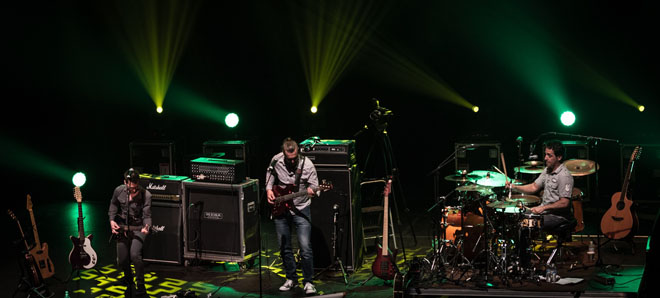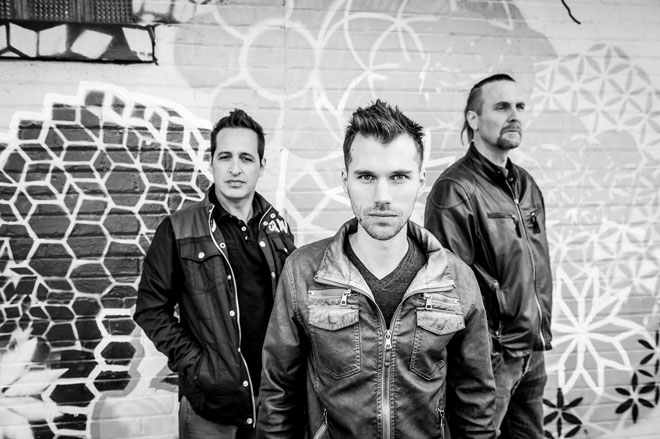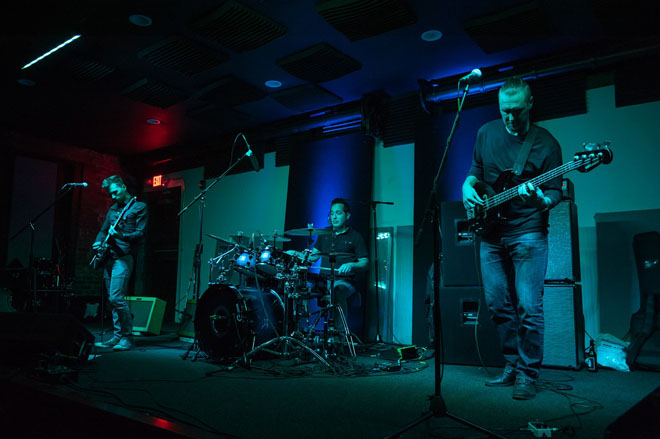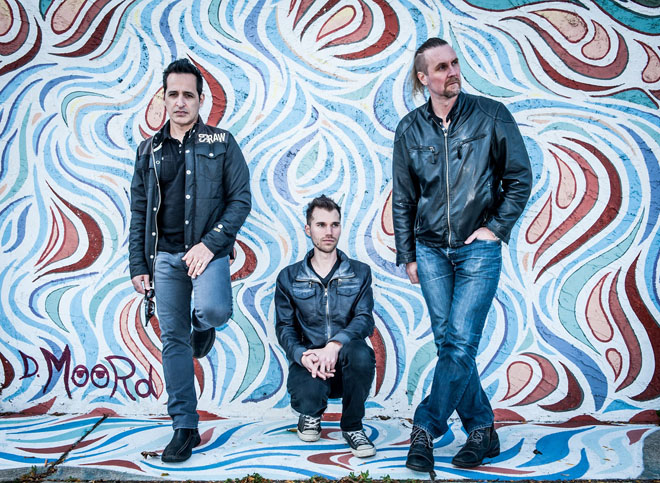VIDEO FEATURE & WEB-EXCLUSIVE INTERVIEW
Band: THE FRINGE
Musician: NICK D’VIRGILIO
Song: “A Second or Two”
Songwriters: Jonas Reingold, Randy McStine, Nick D’Virgilio
Video by: Nigel Dick
The Fringe is a power prog rock trio, a supergroup if you will, consisting of prog veterans Nick D’Virgilio (Spock’s Beard, Big Big Train) on drums, Jonas Reingold (Karmakanic, The Flower Kings) on bass, and Randy McStine (Lo-Fi Resistance) on guitars and vocals. If you ask them, they’ll say that you “take a little pop, add a dash of rock, and throw in some progressive elements and you get a great vehicle for the trio to play and be creative.” The music they create together reflects who they are as individual players. When they get together and write a great song, like “A Second or Two,” and use it as a main course to sprinkle all these other intangibles on top—that’s when they create this unique combination that makes a powerful, indelible impression on the listener.

Photo credit: Nigel Dick
They’ll be the first to tell you that “even the simple stuff feels good.” With professional restraint and the use of space, “it makes the simple music stand out in a good way—especially when the grooves are really solid and funky.” There’s just a great vibe and power to the music that they create together. With all the different styles on this record, the simple sound juxtaposed with all the crazy music that’s cooked up by this trio is powerful. There’s a good balance created for this new album. They’ll be the first to tell you that it makes the biggest difference with all three of them in the same room—and that’s why this project is so strong. It is also what makes them a real band in this day when most musicians are emailing files and piecing the music together.
When you have an open, creative “setting like Sweetwater Studios, with all the gear at your disposal—you can think of a sound, and make it happen right there on the spot.” At Sweetwater, they “had the ability to create sounds that they didn’t bring with them.”
We talked with drummer and co-founder of The Fringe, Nick D’Virgilio, about the music this trio created together, their creative process of writing the songs, and the magic created by playing together in the same room—while making this landmark album at Sweetwater Studios.

Photo Credit: Erick Anderson
THE FRINGE, NICK D’VIRGILIO Web-Exclusive Interview
with M Music & Musicians magazine publisher, Merlin David
How did the idea of “A Second or Two” come to you?
The song started as a riff from Jonas our bass player and fellow writer. With the big gang vocal being the first part. We were all in the studio together and worked out the sections. That’s what is so cool about this record in general—we worked out things together in the room and then went right into recording. Jonas had an idea for the melody in the verses as well, and then Randy took that and put the lyrics in.
Tell us how the band, and this album, evolved.
The Fringe came together in a very organic kind of way. I was asked to play at a big drum festival over in Poland that I had played at a couple of times on my own. I didn’t want to do that again—playing to tracks on stage by myself. I was able to convince the organizer into letting me bring some other musicians. Randy and I had worked a bit on his solo records and a few live acoustic gigs. I played with Jonas on a tour of two of his other bands: Karmakanic and Agents of Mercy. I was filling in on drums on that tour, and in the past we toured together with our other bands. Both of these guys are amazing musicians, and I knew we could get something together for the drum festival that would be fun. It turned out very well, and from that I think we all knew we should try something more. Then there was an opportunity to do a “progressive rock” recording workshop at Sweetwater, and the two of them were a perfect match. And after that workshop, we knew a band project was on the table.
This album has a lot of variety.
We brought all of our influences to the table. From metal, jazz, pop, funk, R&B to Prog-rock, and turned that into some really fun songs—and grew from the ground up. Some started as guitar riffs, or a groove on drums, or just a group jam. It took a couple of years to get the record done but that was mainly because we only had a couple weeks at a time in the same room together. We did that a few times and then finally it all came together as a complete product.
What is your creative process?
That really depends and changes all the time. Sometimes I could be just sitting on the couch watching a baseball game on TV and strumming my acoustic guitar, and then something will hit me. Or I could be in a quiet place singing or in the studio playing piano. For me it seems random where the ideas come from, but then once I have a solid idea, I try to get something recorded as quickly as possible and build from there. My iPhone is filled with more song ideas than just about anything else. I find it an almost essential tool to have around.

Photo credit: Nigel Dick
As a seasoned, well-respected drummer, what is your unique approach to this album?
My approach was to come up with solid and memorable drum parts for most things, and then when the time was right—to go off the rails a bit. I find our music pretty straight ahead, even though there are some odd time signatures here and there. So being as groovy as possible was and is how I always try to play. We also have a few great jam sections where we just freely played off of each other. So I was able to do a bit of everything. It was great fun to record, and a blast to play live.
Tell us one experience where something unique inspired you to write a song.
I’d say the song “The Bottom Line” from the Spock’s Beard record Feel Euphoria (2003) encompasses a lot of what your question asks. It is a song in two halves, and the first half is relationship based. I have been with my wife Tiffany for 27 years! We have had our fair share of times where we do not get along. Luckily we learned a long time ago that if we don’t communicate, then nothing gets fixed—and that is the inspiration for the first half. The second half came from watching a lot of extreme athletes that go for the craziest stunts, and from what it looks like when you are watching them do these unbelievable things. It looks like they have absolutely no fear. They just put their mind to it and go. The second half of the song gets inspiration from that—to show either one in the relationship going for something a bit extreme to prove their love for the other person.
How does where you live (Los Angeles / Fort Wayne) or travel influence your music?
Different cities have different vibes and inspirations. The culture is a great study. But what I have found over all the years I have been playing music is that it truly is a universal language. You can sometimes speak that language with total strangers, and have a wonderful experience unlike any other.
Who influenced you to play drums, and how old were you?
I was four years old when I started playing. I guess I should say I was four when I started banging on things. When I was five, my dad bought me my first real drum kit. I have no idea why I started, but I guess I have to thank my father because he saw something there—and felt it was right to get me a kit. I played in the bedroom next to my parents’ room for years. I had very patient parents who didn’t mind turning the TV up loud enough to drown out my drumming.

Photo credit: Joel Barrios for Norrsken Photography
Did you take drum lessons, and how did that influence your music?
I was self-taught until I was 18 and went to music school—the Dick Grove School of Music in Los Angeles. My older brother turned me onto so much great music growing up, and I just copied what I heard. I did get some tips and tricks here and there, but didn’t really study until music school. I played different instruments in grade school like trumpet, baritone, French horn, and others, so I learned to read music and that helped me out a lot. Once I got into music school, I was able to run with all of it. I ended up not studying drums the whole time in school though. I found it a lot more interesting and helpful studying songwriting, music theory, composition and singing—things I didn’t know as well as drums.
Tell us about being a member of the critically acclaimed prog rock band Spock’s Beard.
It was an amazing experience being in Spock’s Beard because it was a band that I was in from the very beginning—and was able to be a part of building a brand, building a fan base, and really entertaining people all over the world. When SB started in the early 1990’s, we didn’t even think anyone was listening to that kind of music anymore. Grunge was really taking over at that time. We just played it because we enjoyed it, and then we quickly realized that others were into it too. It also helped a lot that Neal Morse could write so much killer music. He is a very prolific writer. It is so cool to have been part of a band that really touched a lot of listeners.
Tell us about your work with the Kevin Gilbert (Toy Matinee, Giraffe, Tuesday Night Music Club).
Kevin Gilbert, I feel, is one of the main reasons why I am where I am today. He gave me my break in the music biz. Before I randomly met Kevin at a ski resort outside LA, I was just hustling my way and trying everything I could to play and meet people. Kevin was in a much bigger scene then I was, and he brought me into all of it—taught me so much about making music, and became a great friend. He was so talented and it really blew me away sometimes. I really only knew him for a short time because he passed away so young. Working on his rock opera The Shaming of the True directly with him, and then being able to be a part of finishing it, is one of the best musical accomplishments of my career. It is a powerful record that I hope more people get the chance to listen to.
You’ve worked with Tears for Fears, Jordan Rudess and many other musicians. Tell us about essentially replacing Phil Collins on Genesis’ last studio album, Calling All Stations.
I was on the road with Tears for Fears in the UK. I called Kevin one day, and he told me he found out that Phil Collins left Genesis. He said since I was in London that I should try and get an audition, or at least find out some information—so that is what I did. While in London I found out where the management offices were, took the tube (subway), and went there to invite them to the TfF show that night, and to try to get an audition. I had the first Spock’s Beard CD with me, and gave them that to hear something. I don’t think anyone came to the show but after the tour was over, I heard from Nick Davis—who was their producer at the time. He called me on a Sunday morning and asked for some other things I played on. I didn’t have much, other than the stuff I was recording with Kevin at the time—and that’s what I sent. A while after that I got another call asking if I wanted to fly over to the UK and have an audition. Of course I said “Yes!” They flew me there and I hung out with Mike Rutherford and Tony Banks for a couple of days. What a trip that was! (Laughs) I grew up listening to them—Genesis was truly my favorite band growing up, and there I was in their studio. It was a total blast. From that point, they asked me back to do the real recording for the Calling All Stations record. Never in my life did I think I would have my name as drummer on a Genesis record. Life is a trip sometimes.
You had a wonderful opportunity to tour the world with Cirque du Soleil and their big shows, huge production, high level of excellence. How did that influence your music?
Cirque taught me a lot about how to be part of a big organization and run a big show. 160 people all working together to put on a big production every night. It was like being part of a huge rock show—just with some crazy acrobatics going on all around. I was lucky too because the music for the show I was in, TOTEM, was very percussive and had a lot of drumming. I got to really play every night.

Photo Credit: Joel Barrios for Norrsken Photography
Top 5 Musicians or Songwriters who inspired you to become a musician?
A Top 5 is so hard to pick because really, there are so many more, but:
Phil Collins
Peter Gabriel
Paul McCartney
Tony Williams
Jimmy Page
What equipment can you not live without—that helps you write, record or perform?
I can’t really do much without my drums, but I would say an acoustic guitar. I write a lot on guitar, so I really need one of those around. I spent many years playing Mapex drums, Meinl cymbals, Aquarian drumheads, and Vic Firth drumsticks—and they all had a giant part in molding a sound for me. I did play others over the years, and now that I am working at Sweetwater, I have the amazing opportunity to play so many more great instruments. I can get any sound I can think of. I love playing a Rickenbacker bass, Gibson acoustic, Les Paul electric, and a Fender Telecaster.
Any musicians or songwriters you’d love to work with in the future?
Steven Wilson, Justin Timberlake, Sara Bareilles, Matthew Bellamy
Tell us about a unique recording experience.
Recording with Peter Gabriel was pretty epic. I was recording with Roland Orzabal for his solo record Tomcats Screaming Outside (2001) at his studio near Bath, England. Peter was working with a producer named Chris Hughes, who produced Tears for Fears’ first two records, among many others. Peter’s studio “Real World” is not very far from Roland’s. Chris rang over to Roland’s place and asked to talk with me. When I got on the phone with him he asked if I wanted to come over and record with Peter for a song paying tribute to Princess Diana. I was freaking out a little, to say the least. (Laughs) Talk about being in the right place at the right time. It was later in the day already, so Roland didn’t mind that I took off to go to Peter’s place.

Photo Credit: Erick Anderson
People say Real World Studios is a truly amazing facility.
Real World is a huge compound with not only the studios, but with a bunch of living quarters, a full kitchen staff, office space, and other things as well. It was around dinnertime when I arrived, so we had dinner first—and it was awesome. Hanging out with Peter Gabriel, drinking some wine, talking about all kinds of things, and having a great meal. After a very leisurely meal, we went and played ping pong for an hour or so. (Laughs) How crazy is that? Both Peter and his chef at the time loved to play. I grew up playing a lot of ping pong and thought I was pretty good, but I got slaughtered—barely got a point off either of those guys. After that, we finally made our way into Peter’s writing room—which is basically a full-on recording studio, and we worked on the song. The final version of the song didn’t turn out quite like I recorded it, but the jam between us was amazing. He played a Rhodes and we just jammed. It was a bit surreal for me, but what a wonderful time it was.
Tell us about a memorable live performance.
There are many. A crazy one was my very first Tears for Fears gig in Miami, FL. I had a bit of trouble getting my drums delivered from Mapex. Something happened with FedEx, and only part of the kit showed up. So we ended up having to rent a kit for those first two shows. On the first night of my first gig with the biggest band I had ever played with—I had a gear malfunction. About halfway through the show, I now forget what song it was, my kick drum beater went through the kick drum head. Right through it! (Laughs) In all the years I had been playing drums that had never happened, but it did that night. Of course, I was freaking out. I had to tell Roland to vamp with the audience for a few minutes while I plastered a ton of Gaff tape all over the drumhead. There was no time to replace the head so that was all I could do. It was nuts. I made it through the show, and I think Roland appreciated the fact that I was able to hold it together—but it sure wasn’t the way I planned the first show to go.
How did you start working with Sweetwater Studios?
My good friend and music compatriot Mark Hornsby became the Director of the recording studios there. After almost five years, my job with Cirque was coming to an end, and I was looking for work. I needed to do something. Mark was trying to build a team and environment at Sweetwater that would make it a destination facility. I was lucky enough to be asked to be one of the new players. I talked a lot with my wife Tiffany, and my kids, and we all decided it was worth a try. It has proved to be a very good decision.
You are now an integral part of the team. What unique approach does Sweetwater Studios offer musicians who want to record an album?
There are many unique features at Sweetwater that no other studio that I know of has. The campus is beautiful, huge, and has a lot to offer outside of the recording facility. The café, coffee bar, and gym are just a few things that are different than most studios. The studios themselves are top notch, and the gear selection is amazing. Pretty much anything you can think of is there to use. If it is not, then it is easily accessible. And the environment is friendly, inviting and creative.

Photo Credit: Erick Anderson
Best advice someone has given you.
Don’t believe your own BS—that’s straight from my father’s mouth.
What’s something you’d like to tell this next generation of musicians?
Study, learn everything you can, show up on time, don’t be lazy, make sure your gear is ready to use and sounds good, be a good person, help others, and work your ass off.
What are your Top 5 favorite albums of all time?
That is impossible to answer, but…
Selling England by the Pound (1973) – Genesis
Led Zeppelin IV (1971) – Led Zeppelin
Absolution (2003) – Muse
The Beatles [White Album] (1968) – The Beatles
Lifetime—The Collection (1992) – Tony Williams
Where can new fans of The Fringe get more info and stay updated?
Everything web:
www.TheFringeTrio.com
https://www.facebook.com/thefringetrio/
Twitter: @thefringeNRJ
Instagram: @thefringetrio
‘When The Fringe get together and write a great song, like “A Second or Two,” using rock, pop and progressive elements, they create this unique combination that makes a powerful, indelible impression on the listener.’

Photo Credit: Erick Anderson




comment closed